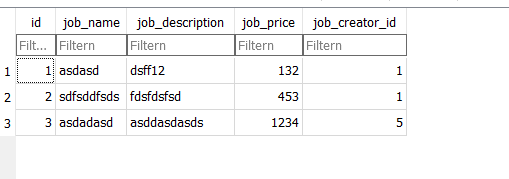Hey,
I created a Job Model with a ModelForm to create the Job. If I click the submit button at the form this error messages appears:
Internal Server Error: /createjob/
Traceback (most recent call last):
File "C:\Users\Finn\AppData\Local\Programs\Python\Python39\lib\site-packages\django\db\backends\utils.py", line 84, in _execute
return self.cursor.execute(sql, params)
File "C:\Users\Finn\AppData\Local\Programs\Python\Python39\lib\site-packages\django\db\backends\sqlite3\base.py", line 423, in execute
return Database.Cursor.execute(self, query, params)
sqlite3.IntegrityError: NOT NULL constraint failed: Site_job.job_creator_id
The above exception was the direct cause of the following exception:
Traceback (most recent call last):
File "C:\Users\Finn\AppData\Local\Programs\Python\Python39\lib\site-packages\django\core\handlers\exception.py", line 47, in inner
response = get_response(request)
File "C:\Users\Finn\AppData\Local\Programs\Python\Python39\lib\site-packages\django\core\handlers\base.py", line 181, in _get_response
response = wrapped_callback(request, *callback_args, **callback_kwargs)
File "C:\Users\Finn\PyCharmProjects\JobMaze\JobMaze\Site\views.py", line 77, in job_create
form.save()
File "C:\Users\Finn\AppData\Local\Programs\Python\Python39\lib\site-packages\django\forms\models.py", line 468, in save
self.instance.save()
File "C:\Users\Finn\AppData\Local\Programs\Python\Python39\lib\site-packages\django\db\models\base.py", line 726, in save
self.save_base(using=using, force_insert=force_insert,
File "C:\Users\Finn\AppData\Local\Programs\Python\Python39\lib\site-packages\django\db\models\base.py", line 763, in save_base
updated = self._save_table(
File "C:\Users\Finn\AppData\Local\Programs\Python\Python39\lib\site-packages\django\db\models\base.py", line 868, in _save_table
results = self._do_insert(cls._base_manager, using, fields, returning_fields, raw)
File "C:\Users\Finn\AppData\Local\Programs\Python\Python39\lib\site-packages\django\db\models\base.py", line 906, in _do_insert
return manager._insert(
File "C:\Users\Finn\AppData\Local\Programs\Python\Python39\lib\site-packages\django\db\models\manager.py", line 85, in manager_method
return getattr(self.get_queryset(), name)(*args, **kwargs)
File "C:\Users\Finn\AppData\Local\Programs\Python\Python39\lib\site-packages\django\db\models\query.py", line 1270, in _insert
return query.get_compiler(using=using).execute_sql(returning_fields)
File "C:\Users\Finn\AppData\Local\Programs\Python\Python39\lib\site-packages\django\db\models\sql\compiler.py", line 1416, in execute_sql
cursor.execute(sql, params)
File "C:\Users\Finn\AppData\Local\Programs\Python\Python39\lib\site-packages\django\db\backends\utils.py", line 98, in execute
return super().execute(sql, params)
File "C:\Users\Finn\AppData\Local\Programs\Python\Python39\lib\site-packages\django\db\backends\utils.py", line 66, in execute
return self._execute_with_wrappers(sql, params, many=False, executor=self._execute)
File "C:\Users\Finn\AppData\Local\Programs\Python\Python39\lib\site-packages\django\db\backends\utils.py", line 75, in _execute_with_wrappers
return executor(sql, params, many, context)
File "C:\Users\Finn\AppData\Local\Programs\Python\Python39\lib\site-packages\django\db\backends\utils.py", line 84, in _execute
return self.cursor.execute(sql, params)
File "C:\Users\Finn\AppData\Local\Programs\Python\Python39\lib\site-packages\django\db\utils.py", line 90, in __exit__
raise dj_exc_value.with_traceback(traceback) from exc_value
File "C:\Users\Finn\AppData\Local\Programs\Python\Python39\lib\site-packages\django\db\backends\utils.py", line 84, in _execute
return self.cursor.execute(sql, params)
File "C:\Users\Finn\AppData\Local\Programs\Python\Python39\lib\site-packages\django\db\backends\sqlite3\base.py", line 423, in execute
return Database.Cursor.execute(self, query, params)
django.db.utils.IntegrityError: NOT NULL constraint failed: Site_job.job_creator_id
I guess something is wrong with the job_creator Field in my Models.py. I’ve used the normal user from the Auth Library for my ForeignKey.
Models.py
from django.db import models
from django.contrib.auth.models import User
class Job(models.Model):
job_name = models.CharField(max_length=50)
job_description = models.CharField(max_length=200)
job_creator = models.ForeignKey(User, on_delete=models.CASCADE)
job_price = models.IntegerField()
Forms.py
from django.contrib.auth.forms import UserCreationForm
from django.contrib.auth.models import User
from django.forms import ModelForm
from .models import Job
class CreateUserForm(UserCreationForm):
class Meta:
model = User
fields = ['username', 'email', 'password1', 'password2']
class JobForm(ModelForm):
class Meta:
model = Job
fields = ['job_name', 'job_description', 'job_price']
views.py
def job_create(request):
if request.method == 'POST':
form = JobForm(request.POST)
if form.is_valid():
form.save()
return redirect('home:adjust')
else:
form = JobForm()
return render(request,
'home/job_create.html',
{'form': form}
)


